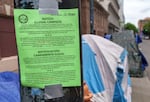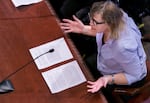Portlanders are divided on a controversial plan to ban unsanctioned camping in the city as the plan gains momentum within the City Council.
Over 200 of them testified this week on a plan to create at least three large government-approved camping sites, accelerate the creation of affordable housing units, and allow Portland leaders to ban camping on city streets. The plan was proposed by Mayor Ted Wheeler and Commissioner Dan Ryan, who oversees the city housing bureau.
Wednesday afternoon’s council session, which turned into an evening session with seven hours of testimony, was the first opportunity the public had to weigh in on the plan.

A posting is taped near a group of tents in downtown Portland, giving notice that the area will be swept, May 20, 2022.
Kristyna Wentz-Graff / OPB
The reaction was mixed. While many opponents decried the ban as inhumane and unfeasible, there were also a number of supporters, many of them in the hospitality and real estate industry, who said they believed the series of resolutions would finally turn around the crisis playing out on many city blocks. Polls show the majority of voters are seething over the proliferation of homeless tents across Portland.
“These resolutions finally lay out a plan that raises to the scale of our homelessness crisis,” said Andrew Hoan, the president of the Portland Business Alliance, the city’s largest chamber of commerce.
Other business and real estate interests urging a yes vote on the measure included restaurant and hospitality advocacy groups and the Oregon Business & Industry. Speakers said businesses were hurting and tourists were asking their hotel managers what had gone so wrong in once-desirable neighborhoods.

“My home, Portland, is no longer safe,” says Tiana Tozer, a Portland resident and the lead plantiff in a class action against accusing the City of Portland of ADA violations for not keeping sidewalks clear of tents and campers. Tozer spoke during public comment portion of the Portland City Council meeting on Wednesday, Oct. 26, 2022, on a series of resolutions that aim to build at least three large city-sanctioned camping sites and ban other homeless camping across Portland.
Kristyna Wentz-Graff / OPB
A number of plaintiffs in a class action lawsuit against the city aimed at ending outdoor camping also spoke out in support of the measure. Last month, a group of individuals with disabilities sued the city, arguing tents blocking access on sidewalks amount to a violation of the Americans with Disabilities Act.
Tiana Tozer, the lead plaintiff in the lawsuit, urged the council to adopt the plan to ban most camping and move people living outside into government-sanctioned camps on a faster timeline.
“It’s not okay to criminalize homelessness, but neither is it okay to trap people with disabilities in their homes,” she said. “We, your constituents with disabilities, are here today to ask for you to provide the access that is our right under the ADA.”
Wheeler said he believed the plan would help resolve the lawsuit.
A number of homeless providers and advocates spoke out against Wheeler and Ryan’s plans arguing they would criminalize homelessness and force people into dangerous and overcrowded campsites against their will. Other providers voiced skepticism that city officials, who have struggled to build six smaller outdoor camps, could pull off something of this scale.
“I can tell you again and again and again campings bans come up as something politicians brandish to placate some constituents while making life unbearable of others,” said Kaia Sand, the executive director of homeless advocacy group Street Roots.

Victoria Burton, left, and Keith Martin talk outside of the Portland City Council chambers after speaking on Wednesday, Oct. 26, 2022. Burton says she has almost stepped in human feces, and needles, and encounters people with addiction and mental illness regularly. Martin says he carries bear spray with him when he has to go out at night and has to take his mobility scooter into the road because of tents on the sidewalks. “It’s very hard to live when you are handicapped, downtown,” says Martin.
Kristyna Wentz-Graff / OPB
Jennifer Parrish Taylor, director of advocacy for the Urban League of Portland, said she appreciated the housing-focused portion of that proposal, in which Wheeler and Ryan set a goal for the city to building 20,000 affordable housing units in the next decade. But she warned the camping ban, which would make it illegal for Portlanders to camp on city streets, would have the harshest impact on Black Portlanders, who make up a disproportionate percentage of the city’s homeless population.
“A camping ban will undoubtedly lead to an increase in the arrest and criminalization of Black people whose only crime is poverty,” she said.
Tilted testimony?
Some of the earliest testimony in the seven-hour-long council session came from Portland realtors and brokers, who said the city needed to pass the plan to repair the city’s reputation and bring back developers who fled to other cities to escape Portland’s homeless crisis.
Some pointed questioning from Commissioner Jo Ann Hardesty revealed that a council member had pushed the realtors to the front of a very long list of people who wanted to testify. Hardesty said she’d been getting texts from people who signed up on Saturday, but had been pushed down in the order. She asked the mayor if the council had “stacked the deck in the beginning” to prioritize the voice of realtors.

The Portland City Council hears public comment on Wednesday, Oct. 26, 2022, on a series of resolutions that aim to build at least three large city-sanctioned camping sites and ban other homeless camping across Portland.
Kristyna Wentz-Graff / OPB
It’s common for commissioners to invite someone to council to offer their opinion about pending ordinances and resolutions. It is always made clear that these people have been invited to speak by a council member. Those who aren’t invited by council members traditionally testify in the order they signed up.
No one claimed responsibility for the rejiggering of the order during the meeting. After media inquiries, a spokesperson for Mayor Ted Wheeler said Ryan’s office had moved the speakers closer to the top of the list.
TJ McHugh, a policy advisor for Ryan, said in an email the realtors had been invited to testimony.
“Typically invited testimony speak after staff for presentations. Due to the logistics today of multiple resolutions being read at once, this required some nuanced maneuvering,” McHugh wrote. “Therefore, all invited testimony happened before taking public comment.”
This was not made clear in Wednesday’s meeting. When Wheeler asked if anyone aside from him and Hardesty had invited someone to testify, no commissioner spoke.
Ryan’s office has not responded to an inquiry into why the realtors were not designated as invited testimony.
The council is scheduled to consider changes and take a final vote on Nov. 3.
